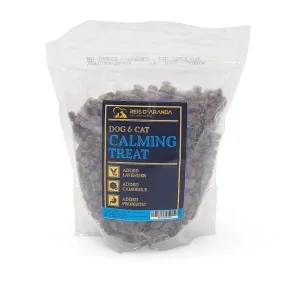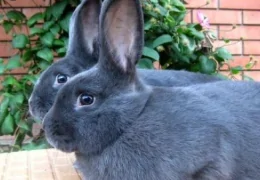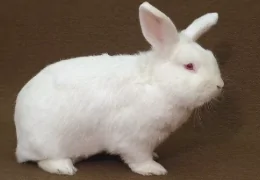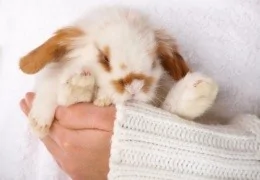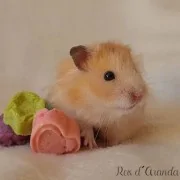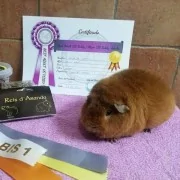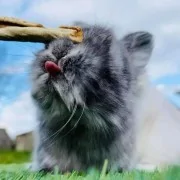Its name says it all: the Vienna blue rabbit comes from Austria. Not only is it beautiful with its shiny blue-grey...
OVERGROOMING IN CATS
INTRODUCTION
Overgrooming is excessive grooming and is a behaviour that goes beyond normal grooming for coat and odour maintenance. If your cat is overgrooming, you will notice patches of broken or sparse hair, complete hair loss in some areas and sometimes skin lesions.
In extreme cases, a cat may chew or bite its paws or tail, causing significant injury. In the case of the tail, partial amputation is sometimes necessary. When cats feel itching or pain, they do not scratch with their hind legs, but try to relieve the discomfort by licking or biting. Overgrooming usually has a physical cause (severe pain or itching) or may be a response to stress.
CAUSES OF OVERGROOMING IN CATS
The two main causes of overgrooming are behavioural, when the cat begins to lick excessively as a form of stress relief (also known as psychogenic alopecia), and medical, when skin allergies or skin parasites are the main culprit.
It may not be obvious to you, but the home environment can be very stressful for your cat. Particular stressors for cats don't always register on our human scale, but they can cause as much havoc as a serious problem at work or having to write an urgent last-minute report.
The biggest cause of stress for cats is other cats, both at home and in the neighbourhood. By nature, cats are solitary creatures and may find living with other cats very stressful. This may not manifest itself in an aggressive manner towards other cats, they may even be happily cuddled together, but your cat may have problems with stress and resort to over-care.
Some of the most stressful situations for a cat are:
- Moving house
- New furniture
- New family member
- New schedule
Before making a change in your lifestyle, consider whether it is likely to affect your cat. They are creatures of habit and will be the first to react to anything new in your life. Routine can help alleviate a cat's excessive grooming problem.
Allergies or parasites can significantly change your cat's grooming schedule.
Fleas, mites, ticks: these almost invisible critters can make your cat's skin very itchy, which can lead to a second problem, that of excessive grooming. If this is the reason for your cat's incessant licking, talk to a vet for advice on the most effective treatments.
However, it is important to remember that when it comes to fleas and ticks, prevention is your best ally. Keep up with regular preventative treatments for fleas, worms and other parasites and you are likely to avoid the problem altogether. It is also important to treat the environment regularly: 95% of fleas are found in the environment, so environmental management and treatment of the pet itself is very important.
It has been observed that some breeds of cats, such as the Abyssinian and Siamese, are more likely to groom excessively. However, there is no consensus on how common this behaviour is among these breeds. When environmental changes or skin allergy occur, cats, regardless of breed, may opt for excessive grooming as a soothing solution.
CONSEQUENCES OF EXCESSIVE GROOMING IN CATS
The consequences of excessive grooming in cats are varied and the symptoms and severity of these vary from case to case:
- Alopecia
- Dermatitis
- Skin infections
- Bleeding wounds
- Fungus
- Hair oxidation
- Ulcers
- Genital or urinary tract infections
HOW TO PREVENT COMPULSIVE STRESS GROOMING?
MARK ROUTINES: No matter how big or small the change, be sure to pay attention to how your cat reacts. It's generally a good idea to maintain as many routines as possible for your cat. Stick to the normal feeding schedule, the place where he eats and always eating from the same bowl. Your cat will appreciate this stability. However, in other cases, you can try some different environmental modifications and see how your cat reacts.
OFFER A HIDING PLACE: Your cat should have the opportunity to hide from time to time, to take his mind off all the changes in his new environment for a while. Finding a place where your cat can go and rest is essential to keep him calm and away from any thoughts of excessive grooming.
PLAY WITH YOUR CAT: Sometimes all your cat needs is a little attention to relieve his stress. Encourage him to chase toys, jump in and out of a box, run down the hallway after a ball of paper.... Have several of his favourite toys available and play with the cat frequently. If he likes to go outside, and it is possible, make sure he has access to fresh air with a trap door to reduce his stress.
MEDICATION: Sometimes, if the reason your cat is stressed cannot be directly addressed, your vet may recommend treating it with anti-anxiety medication. Don't hesitate to ask your vet for help if your cat's excessive grooming habit doesn't go away. Some medications are in pill form, such as Zylkene, while others, such as Feliway and Pet Remedy, are more ‘natural’ medications that come in the form of diffusers and sprays.
CONCLUSION
Excessive grooming in cats can be a sign of an underlying problem. If your cat is grooming excessively, it is important to take him to a veterinarian so that he can diagnose the cause and recommend appropriate treatment. With early attention and appropriate treatment, your cat can be helped to overcome this problem and improve his quality of life.
Leave a comment
Log in to post comments




